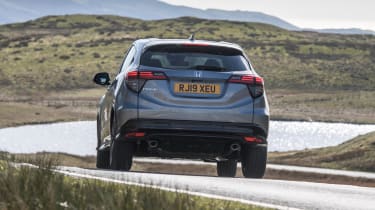Honda HR-V SUV - Engines, drive & performance (2015-2020)
The Honda HR-V is more of a cruiser than a sporty SUV, but it still performs well
Not all crossover SUVs are the same in this area: some aim for sporty handling and a low driving position (like the Mazda CX-30) while others prioritise a cosseting and comfortable ride (like the Peugeot 2008).
The Honda HR-V is at the softer end of this spectrum, with a smoother ride than the Nissan Juke. Its suspension has been designed to absorb bumps rather than carve through corners, so body lean is quite significant – something that passengers will feel if you get too aggressive with your steering inputs. This is improved in the Sport, which comes with ‘Performance’ dampers and something called ‘Agile Handling Assist’ to make it better through fast corners.
The steering is light and precise, but a touch overly assisted and doesn't provide much in the way of driving feel throughout the rest of the range.
We like the six-speed manual gearbox – it has a short, stubby gearlever that feels great in your hand and changes smoothly. However, we don't like the CVT automatic. It makes the HR-V less economical on paper, it feels like it's sapping power when you're on the move and it doesn't help that it costs around £1,000 more than the manual. We’d avoid it unless you really must have a HR-V with an automatic gearbox.
More reviews
In late 2020 Honda announced that the diesel engine in the HR-V line-up would be discontinued.
Honda HR-V petrol engine
The standard 1.5-litre petrol is capable of doing 0-62mph from 10.2 and 10.7 seconds, depending on trim level, with the six-speed manual gearbox. With the CVT automatic transmission fitted, the same sprint takes 10.9 or 11.4 seconds. The CVT also makes the petrol engine very noisy. When you accelerate hard, the 0-62mph time feels longer than it really is, because you have to press the accelerator hard to feel like you're making concerted progress.
For the HR-V’s mid-life facelift in 2019, Honda added a more powerful 1.5-litre petrol engine from the Civic to its small SUV’s engine range. Only available on the Sport trim, it has 180bhp compared to the existing 128bhp version available in other trims, which reduces the 0-62mph time to 7.8 seconds (8.6 with the CVT). The speed on offer makes the HR-V Sport accelerate almost like a hot hatch, which takes some getting used to in a small SUV. It feels like something of an odd proposition; the Sport model is powerful but the tall body means it still rolls in corners, and it seems unlikely that buyers looking for a sporty car will consider an HR-V in the first place.










